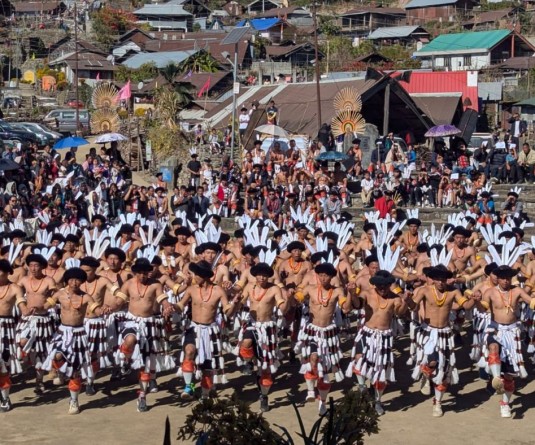L Chinglem Konyak, Extra Assistant Commissioner along with others at Zunheboto on September 27. (Morung Photo)
Zunheboto, September 28 (MExN): World Rivers Day was observed in Zunheboto on September 27 under the theme "Living Rivers: Reviving Ecology, Culture, and Sustainable Livelihood." The event was organised by the Nagaland Community Conserved Areas Forum (NCCAF) in collaboration with the Forest and Biodiversity Management in the Himalayas (Nagaland) Project at Cornerstone Higher Secondary school Zunheboto.
The programme brought together officials, conservationists, village leaders, Students and community members to discuss the ecological and cultural significance of rivers in Nagaland and the urgent need for their protection.
L Chinglem Konyak, Extra Assistant Commissioner (EAC) Zunheboto, delivered the keynote address and highlighted the interdependence of ecological systems, cultural practices, and sustainable livelihoods, particularly in indigenous communities. He expressed concern over the increasing degradation of the natural environment due to deforestation, hunting, and unsustainable fishing practices.
Referring to the Wildlife Protection Act of 1972, Konyak stated that while legal frameworks exist to protect biodiversity, public awareness remains limited. He acknowledged the efforts of village leaders who continue to play a key role in protecting local ecosystems through awareness campaigns and enforcement of restrictions on hunting.
He drew attention to the declining health of rivers in the region, condemning harmful practices such as the use of explosives, chemicals, and electric generators in fishing. He also criticised the commercial extraction of stones from riverbeds, which contributes to the destruction of aquatic habitats and affects river ecology.
Konyak also raised the issue of irresponsible waste disposal, noting that the dumping of garbage into rivers has become a major source of pollution that threatens both human health and biodiversity. He urged citizens to take greater responsibility in safeguarding natural resources, stating that the health of rivers is directly linked to the well-being of communities.
Obed Bohevi Swu, Divisional Forest Officer (DFO) of Zunheboto, offered a reflection on the relationship between rivers, biodiversity, and cultural identity. He emphasised that Nagaland’s rivers including the Diku, Tizu, Doyang, and smaller tributaries are essential to the state’s forests, agriculture, and communities.
Swu stated that despite being dependent on rivers for livelihood and survival, human activities have increasingly led to their degradation. He cited the example of the Doyang River, which has suffered from pollution and overuse, and urged communities to treat rivers with respect rather than exploitation.
He also remarked on the shift in traditional practices among the Nagas, noting that hunting and fishing, once sustainable, have become commercialised and detrimental to local ecosystems.
Ivan Zhimomi, Team Leader Tizu Valley Biodiversity conservation Livelihood Network (TVBCLN) stressed the importance of creating alternative livelihoods through conservation initiatives such as the TVBCLN, which support eco-tourism and sustainable income generation.
He concluded by urging communities to recognise their connection to the land and rivers, and to renew their commitment to protecting natural resources as part of their cultural and ecological identity.
A vote of thanks was pronounced by Setsachum Sangtam, Treasure NCCAF





